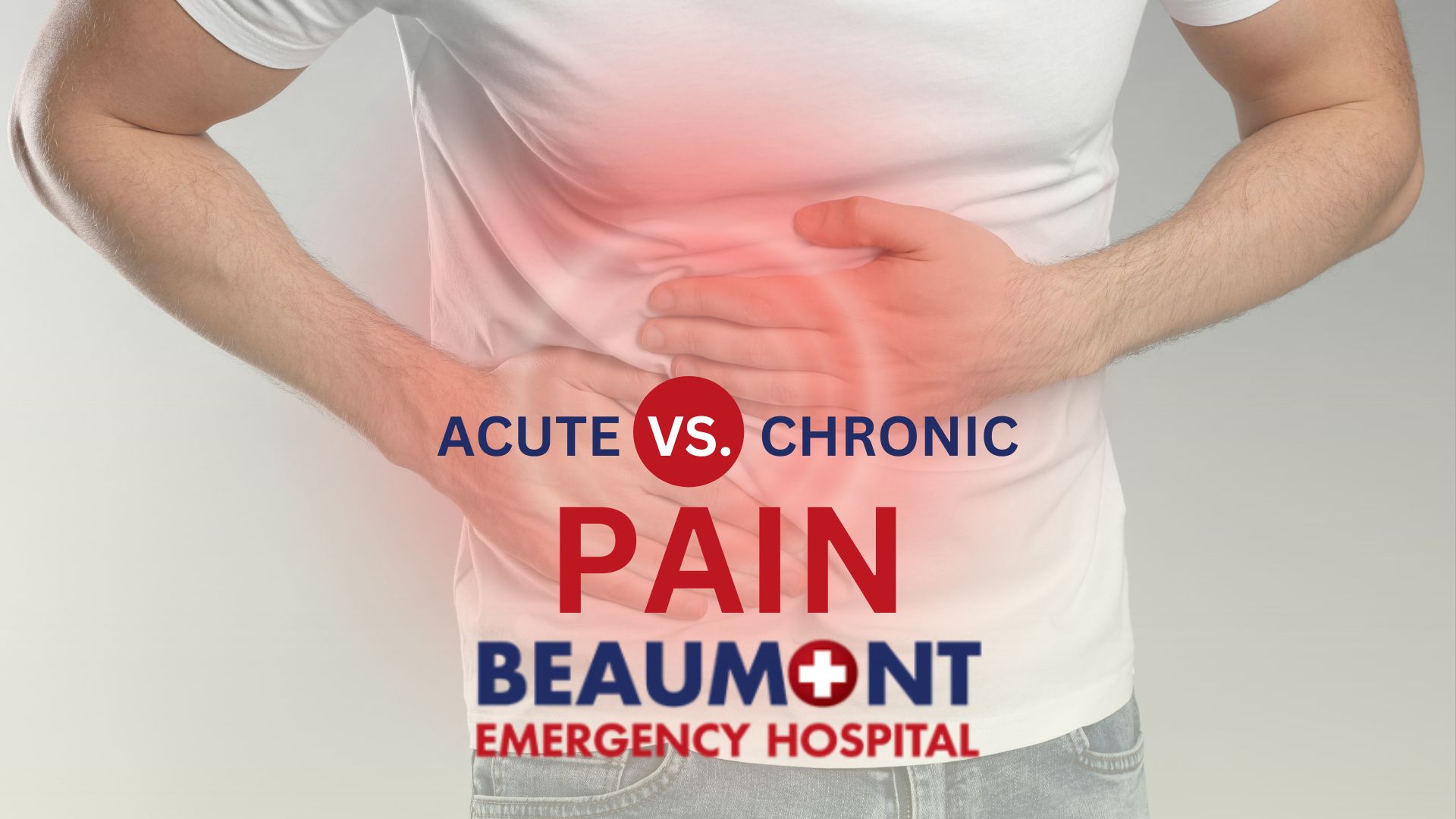
Understanding When Sudden Pain Becomes a Medical Emergency
September marks Pain Awareness Month, a time dedicated to understanding the impact of pain on individuals’ lives and promoting effective pain management strategies. The American Chronic Pain Association has been at the forefront of raising awareness about the challenges of living with chronic pain, providing valuable resources to manage and alleviate pain. While chronic pain often requires long-term strategies, acute pain—characterized by its sudden onset—can sometimes escalate into a medical emergency. At Beaumont Emergency Hospital, we are equipped and ready to address acute pain events promptly and effectively.
How Acute Pain Differs from Chronic Pain
Acute pain and chronic pain are distinct in their nature and duration. Acute pain is a sudden onset of discomfort typically resulting from an injury, surgery, or illness, and it usually resolves once the underlying cause is treated or heals, lasting for a short period—often less than three months. On the other hand, chronic pain persists for longer than three months, often continuing even after the initial injury or illness has healed. This type of pain can stem from ongoing conditions like arthritis, fibromyalgia, or nerve damage, and may significantly impact an individual’s quality of life.
Some individuals experience chronic pain due to a sensitized nervous system that amplifies pain signals, making everyday activities challenging and sometimes leading to psychological effects like depression and anxiety. The management of chronic pain often requires a comprehensive approach, including medication, physical therapy, and psychological support, to improve the individual’s overall well-being. (American Chronic Pain Association)
Holistic Approaches to Managing Chronic Pain
For many individuals, holistic approaches can provide relief from chronic pain, which is different than acute pain. These methods focus on treating the whole person, not just the symptoms. Here are some effective holistic pain management techniques:
- Acupuncture: This ancient Chinese practice involves inserting thin needles into specific points on the body to relieve pain and promote healing (U.S. Pain Foundation).
- Chiropractic Care: Chiropractors use spinal adjustments and manipulations to alleviate pain, particularly in the back and neck (American Chronic Pain Association).
- Exercise: Regular physical activity strengthens muscles, improves flexibility, and can reduce pain (U.S. Pain Foundation).
- Massage: Therapeutic massage can ease muscle tension, improve circulation, and promote relaxation (American Chronic Pain Association).
- Stress-Reduction Techniques: Mindfulness, meditation, and other stress-reduction techniques can help manage pain by reducing stress and promoting relaxation (U.S. Pain Foundation).
- Vitamin or Herbal Supplements: Certain supplements, such as vitamin D, omega-3 fatty acids, and herbal remedies like aloe vera, can support pain management (American Chronic Pain Association).
When is Acute Pain a Medical Emergency?
While some cases of acute pain can be managed at home with rest, over-the-counter medications, or holistic approaches, there are instances when acute pain signals a critical condition. Here are some scenarios where acute pain necessitates an emergency room visit:
- Chest Pain: Sudden chest pain can be a symptom of a heart attack, pulmonary embolism, or other life-threatening conditions. If you experience acute chest pain, especially if it is accompanied by shortness of breath, dizziness, or sweating, seek emergency medical help immediately (Beaumont Emergency Hospital).
- Severe Abdominal Pain: Acute abdominal pain can be a sign of appendicitis, gallstones, or a ruptured aneurysm. If the pain is intense and sudden, it is crucial to get evaluated by a medical professional without delay (American Chronic Pain Association).
- Head Injuries: Any head injury resulting in acute pain, confusion, loss of consciousness, or vomiting requires immediate medical evaluation to rule out concussions, brain bleeds, or other serious complications (U.S. Pain Foundation).
- Acute Back Pain: Sudden, severe back pain, especially if it is accompanied by numbness, tingling, or weakness in the legs, can indicate a spinal cord issue or a herniated disc. Prompt medical intervention is necessary to prevent permanent damage (Beaumont Emergency Hospital).
- Pain Accompanied by Other Symptoms: Acute pain that comes with fever, significant swelling, redness, or changes in consciousness should be assessed by emergency medical personnel to determine the cause and appropriate treatment (American Chronic Pain Association).
Beaumont Emergency Hospital Stands Ready to Treat Sudden Onset Acute Pain
When holistic approaches are not sufficient to manage acute pain, Beaumont Emergency Hospital is here to help. We understand the urgency and distress that acute pain can cause. Our hospital is equipped with state-of-the-art diagnostics available 24/7, 365 days a year, to quickly identify the source of your pain. Our Board-Certified Emergency Physicians are trained to administer immediate and effective pain relief, ensuring you receive the care you need when you need it most (Beaumont Emergency Hospital).
During Pain Awareness Month, we encourage you to recognize the signs of acute pain and understand when it becomes a medical emergency. By being informed and proactive, you can ensure timely and appropriate care for yourself and your loved ones. At Beaumont Emergency Hospital, we are committed to providing exceptional care and relief for all acute and chronic pain events.
Works Cited
American Chronic Pain Association. “Living with and Managing Chronic Pain.” American Chronic Pain Association.
Beaumont Emergency Hospital. “Acute Pain Management and Emergency Care.” Beaumont Emergency Hospital.
U.S. Pain Foundation. “Holistic Approaches to Pain Management.” U.S. Pain Foundation.
